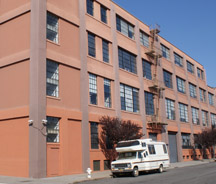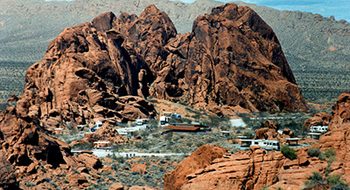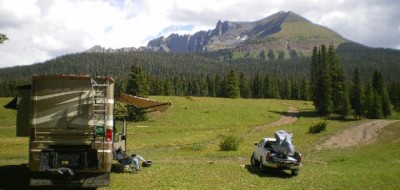Bob Difley
 Torrential rainfall and flooding rivers, midwestern tornadoes, the likelihood of a busy hurricane season, the possibility of power shortages and resultant urban brown-outs, and the predicted increase in home turf terrorist attacks, and you might be wondering how to best handle all these threats to your well-being.
Torrential rainfall and flooding rivers, midwestern tornadoes, the likelihood of a busy hurricane season, the possibility of power shortages and resultant urban brown-outs, and the predicted increase in home turf terrorist attacks, and you might be wondering how to best handle all these threats to your well-being.
Lucky for us road warriors, we already possess one of the ingredients for self sufficiency during a crisis–our RVs. With our at-the-ready, fully stocked, mobile shelter we can be independent of supportive tethers like electricity, water, and communications when the infrastructure fails all around us. We have waste water and sewage storage tanks, generators and solar panels for electricity, a holding tank full of safe drinking water, a stocked pantry, a computer with wi-fi access to communicate and obtain updated news and information, and maybe even somewhere in our cavernous lockers a means of repelling zombies.
But though our survival-mobile is set and ready to go, it doesn’t answer the question of WHERE to go when the s**t hits the fan, the sky is falling, the waters rising, our cities darkened, and the enemy/aliens/terrorists are out there looking for us.
If heading for the boonies comes to mind, you’ve hit on a viable and sensible choice. If it’s floods you’re escaping, head for higher ground, a no-brainer. Tornadoes–head East or West out of the tornado zone. Hurricanes, head north, etc. But what do you do if you are not a fulltimer and you don’t want to just leave your home to the elements or to those who take advantage of the aftermath of a crisis.
This might call for urban boondocking (more like dry-camping, but I won’t quibble), where you can be close to and able to look after and protect your home–if you can’t for various reasons stay on your own property.Urban boondocking requires a different set of rules and skills than boondocking in the wilds of the desert or national forests, where you can be as expansive and obvious as you care to.
In urban boondocking, you:
- Need to avoid the watchful eyes in a residential neighborhood, those who view a strange vehicle appearing on their street for several days at a time with suspicion, a possible threat–especially when left over night.
- Assume a low profile so as to not arouse the suspicion of passing police patrols, that could order you to “move on”.
- And, what may appear contrary to these aims, is to not appear as if your RV is abandoned or not occupied, becoming a lure for break-in artists.
- Going in and out of your RV is OK, though don’t do anything that looks like you are living there, like putting out your slides, camp chairs, or barbecue. Don’t hang out outside your rig: either stay inside out of sight or leave.
- Keep the blinds closed to the curious, and to hide what would appear as someone living within. At night keep inside lights as low as possible, sound from a radio or TV at the lowest level.
- Try to stay out of residential neighborhoods, instead choosing industrial areas, where workers leave the area after 5:00 and are not threatened by somebody parked in an RV.
- Move around, not staying in the same location for more than a couple days at a time.
- Parking lots for stores open 24 hours are good bets, as are park-n-ride lots, transit (bus, train, or airport long-term) parking lots, warehouse areas, and boat marinas.
- There will be others out there doing what you are, so look for places they park without a problem, even move in close by where you both can keep an eye out for each other’s rig.
As you become more experienced with urban boondocking, you will pick up clues and tips of how to be unobtrusive and un-threatening. And of course, these skills can be valuable also when visiting and exploring a city for a few days when no campgrounds are available.
For more on the art of boondocking, check out my eBook, BOONDOCKING: Finding the Perfect Campsite on America’s Public Lands




Geoffrey Pruett
You left out one sure way to be regarded as a bad neighbor (also illegal in many areas), parking withing 50 ft of an intersection or stop sign. Most of us are 12 ft plus and are a major vision block at curbside. Practice manners and your stay for any reason will probably be trouble free.
Bob Difley
Dana – Kudos to Northridge and other communities that recognize that during a disaster, temporarily putting on hold restrictions that would limit residents staying in their RVs is the right thing to do. You would hope that your own community, wherever you live, would do the same, but it would also help to be prudent and prepare for the alternative.
Bob Difley
Pat – Of course, the best plan is to get out of town to a nice isolated spot. But sometimes you just can’t do that. Also, when exploring a city for a couple or so days, urban boondocking is arguably the easiest way (depending on your personal comfort zone) to do that, since the alternative may be driving several miles out of town to the nearest RV park and fighting commuter traffic in and out each day.
Bob Difley
Barry S. says “if the resident of that motor home couldn’t explain why he or she was parked there, he or she would be told to move on. ”
You can park anywhere in a city where legal (like fitting into designated parking spots) for as long as you do not stay longer than any parking limitation signs designate–and no police officer can tell you to move on. The problem is when you decide to stay overnight and city ordnances kick in. That is when you take the “low profile”. As I stated moving every couple days will most likely achieve the low profile aim.
Dana
After the Northridge Earthquake, many people went and got their RVs out of storage and parked them in front of their residences and lived in them while awaiting ‘the system’ to act on their uninhabitable house. In a totally unprecidented move, the L.A. City Council actually did something right and suspended their Urbanite regulations prohibiting parking your RV at your residence in sight of the neighbors! Some folks lived in their RVs at their property for many months.
An RV is a great “lifeboat” for a homeowner if kept reasonably stocked and ready to go. It allows you the option of staying or evacuating while not being totally dependant on the “system” to provide your basic needs. This doesn’t change regardless of the motivations or beliefs of the author.
Pat
Bob…who put the paranoia pills in your coffee? ;-))
As for us, getting out of the city/town is the whole idea…the best place to hide: the Canadien Maritimes!
But, you know…if everyone sought the good of the community, and practiced a life of kindness and mercy with respect for the person next to you, the whole world would be a better place…terrorism (of all kinds) would eventually disappear…kind of like the RVer life style!
As always, thanks for the thoughtful post!
Happy Sunday/dimanche heureux!
Jim G
Have you considered urban boondocking in the South Bronx? I hesitate to think the outcome would be desirable, although it might be an interesting survival experiment
Barry S
Keeping a “low profile” is fantasy. Any half-way competent police personnel would wonder why it was reported to them that a strange motor home was parked nearby and that no one seemed to be living in it. The first thing they would do would be to check if someone died inside, and if the resident of that motor home couldn’t explain why he or she was parked there, he or she would be told to move on.
You might get away with it for a day or two, but parking without asking permission from the property owner seems to be a certain recipe for suspicion, unless of course, the rig is parked where other rigs are regularly parked….such as in a Walmart parking lot.